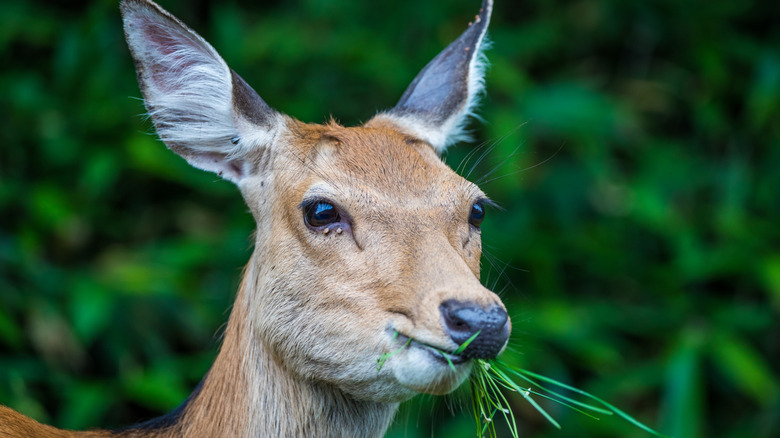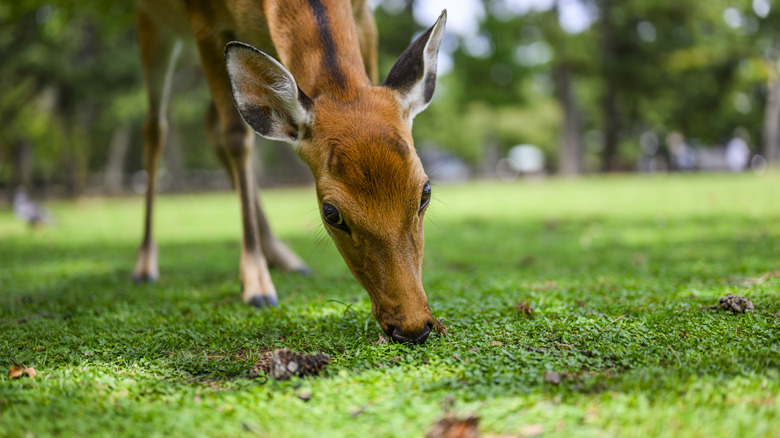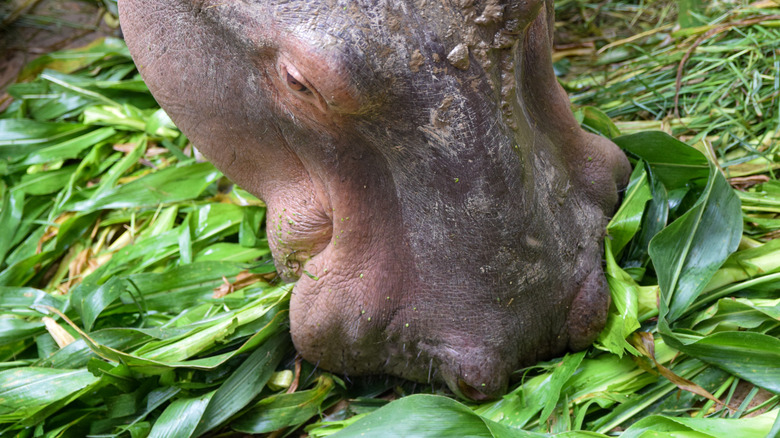Well Actually, Herbivores Will Sometimes Eat Meat
Everyone grows up knowing the difference between herbivore, carnivore, and to a lesser extent, omnivore animals. That's especially the case if you happen to have been into dinosaurs at an early age, where the difference between carnivores and herbivores is a big part of learning your pre-historic beasts. It's all very simple: animals that eat plants are herbivores and those that eat meat are carnivores. Omnivores are those that eat a mixture of the two.
But it turns out that herbivores are, in a way, secret omnivores. That is to say that there are multiple circumstances under which plant-eaters will turn to meat for sustenance — though this is still quite a rare occurrence. That might seem odd given the very clear delineation between the two diets which has come to shape our understanding of animal life. What's more, many herbivore animals are actually evolved specifically to devour plants and not meat, which should make their occasional switch to a carnivorous diet even more unlikely. Deer and cows, for example, are members of the ruminant group of animals, which refers to the fact they have a specialized organ known as a rumen. This chamber sits before the stomach and contains a mixture or bacteria, fungi, and protozoa which turn plant polysaccharides into fatty acids. These acids then provide the main energy source for the animals. As such, you wouldn't imagine such animals would ever eat meat given their specialized physiognomy, but it happens, and there are several reasons why.
Food scarcity can turn some herbivores into meat eaters
It's not very common for herbivores to eat meat, especially given the fact that in many cases their bodies are "designed" specifically to process plant matter. But while it's rare for plant-eaters to turn to meat, there are more than a few examples of this phenomenon taking place. From hippopotamuses to deer, known herbivores have been seen devouring meat on multiple occasions. Why might this happen? Well, there are actually a surprising amount of reasons.
The first and most obvious reason for herbivores eating meat is as simple as "because it's there." Opportunistic meat eating by plant eaters is a known phenomenon, especially when those animals are enduring a shortage of their typical food. Deer are a good example. The animals usually feast on a range of forage and have specific physical traits that allow them to do so effectively, from their narrow snout and long tongue to salivary glands which create enzymes to subdue plant compounds such as tannins that could potentially irritate their digestive system. But deer have also been known to eat bird eggs or carrion when forage is scarce. In some cases, the creatures have even been seen eating other dead deer. And even more unpleasant, a report in the Journal of Forensic Sciences confirms a record of a deer gnawing at human remains. These behaviors are almost always a result of plant scarcity, however, and are certainly not the norm for deer.
Other reasons why herbivores will eat meat
It's not just a lack of their usual food source that can turn herbivores to carnivores. The other reasons why you might see plant eaters going against their typical feeding process aren't as significant as food scarcity, but they are there nonetheless.
Mineral supplementation is one example. Omnivores often benefit from their ability to consume plants and meat when their primary food is scarce, but herbivores may turn omnivorous when they need specific nutrients which they can't get from their forage. "Zoophagy" describes the process of animals feeding on other animals, and herbivores can turn to this form of diet when seeking out minerals lacking from their plant-based diet. According to Montana Outdoor, some animals may consume insects when visiting salt licks to gain their required minerals — though the ingestion of insects here could also be accidental.
Plant eaters can also be influenced by the behavior of animals around them and their own kind, learning to eat meat by watching other creatures do so. In recent years, experts have determined that hippos eat more meat than previously thought. The animals subsist on a grass-heavy diet and are thought of as obligate herbivores, which means they eat only plant matter. But as a 2015 study in Mammal Review notes, field studies have shown that hippos consume flesh and intestinal tissues from other animal carcasses, with researchers stating that this represents a behavior pattern associated with communal feeding.
The only other reason why you might see a herbivore eat meat has to do with their health. If an animal is experiencing health problems, it may cause them to engage in what Montana Outdoor dubbed "aberrant behavior," though this is also a very rare occurrence. So, while many herbivores are, in fact, secret omnivores, for the most part these animal's entire physiognomy has evolved to consume plant matter and there's no reason to rethink the entire herbivore/carnivore/omnivore delineation — except maybe in hippos.


